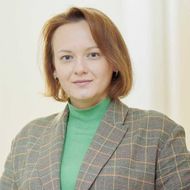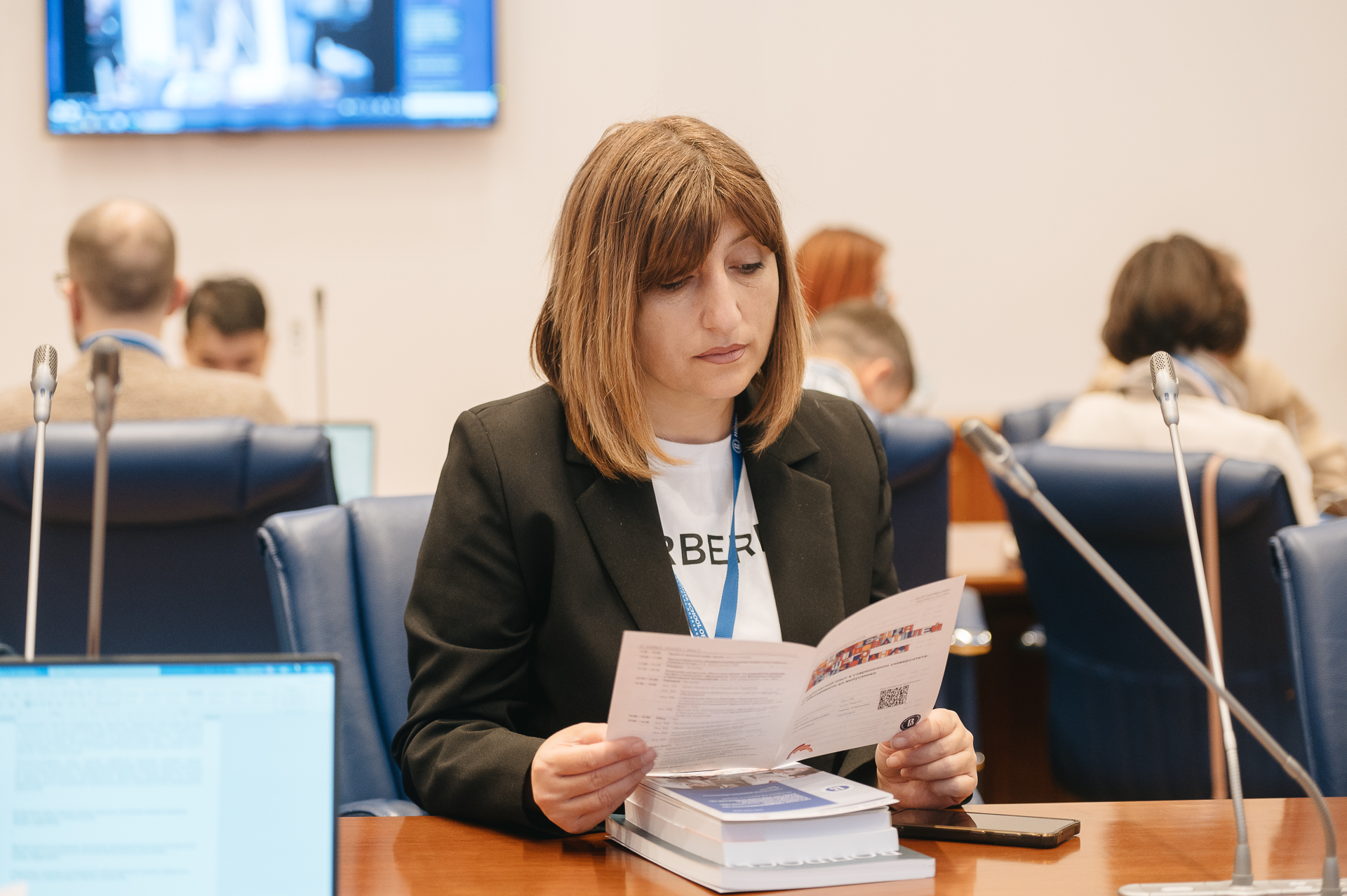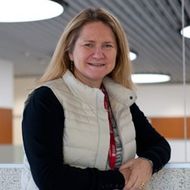XIV International Conference on Higher Education Took Place at HSE University
This year’s conference topic was ‘Student Experience at a Modern University: from an Enrollee to a Graduate’. Over the three days, researchers from Russia and other countries discussed the individual and institutional factors that determine students' educational experience, the impact of this experience on educational performance, and its influence on labour market success. The conference took place from October 25–27 and featured over 90 presentations.
In her opening speech, Vice Rector Elena Odoevskaya explained why student experience was chosen as the key topic of this year’s event.

Elena Odoevskaya
‘Students are the main reason why a university erects walls, creates programmes, and establishes partnerships with industries. They are the ones who will develop our country and others—among the conference participants are representatives from China, the UAE, Sri Lanka, and other countries. Therefore, it is crucial to understand the student experience within a university, their interactions with key stakeholders, and their decision-making process when selecting a university and future career path.’
Evgeniy Terentev, Director of the HSE Institute of Education, described the conference as a friends’ reunion. Fourteen years ago, when the conference was first founded, it was a small-scale affair that none would have predicted would eventually span three days and receive 200 applications.

Evgeniy Terentev
‘One of the primary objectives of the conference over the years has been to foster a research-oriented atmosphere for addressing higher education issues. While there are numerous platforms available for discussing political aspects of higher education development, there is a dearth of opportunities for discussions of evidence-based research. I propose that we take it as a rule to conduct evidence-driven conversations and substantiate our statements and findings with relevant data during the course of these three days.’
Consortia
The first roundtable, which took place on October 25, was dedicated to scientific and educational consortia formed by universities and businesses, and the evaluation of the effectiveness of their interactions.
Elena Odoevskaya moderated the event. She talked about different approaches to the concept of a consortium. For example, in the Priority 2030 programme, it is described as ‘a temporary voluntary association of universities with other organisations to coordinate activities and consolidate resources when implementing breakthrough projects that ensure the scientific and technological development of the country.’

Tatiana Zhdanova, Deputy Director at Sociocentre, told the audience that the Priority 2030 programme involves 132 universities, which have created 390 consortia with over 3,000 partners. These consortia are aimed at solving complex issues for the benefit of regions, industries, and societies, while universities get involved in these activities and attract young people to them.
Anna Stepanova, Deputy Vice President for Educational Projects at VK, spoke about cooperation with universities from the perspective of businesses: for them, the important aspects are the social part of the ESG agenda, interaction with the consumers of their products, and headhunting students. However, she believes that there is still a lack of good practices and partnerships based on mutual interest and benefit, rather than being a burden to businesses or universities.
HSE Vice Rector Irina Martusevich spoke about HSE University’s experience of employer relations and facilitating access to businesses’ young target audiences.

Irina Martusevich
HSE Vice Rector Irina Martusevich spoke about HSE University’s experience of employer relations and facilitating access to businesses’ young target audiences. ‘We give students and businesses an opportunity to shorten the initial introduction period thanks to deep integration in our projects and extracurricular activities,’ she said. Over 65% of HSE students gain working experience during their studies, which helps them make better-informed employment decisions upon graduation.
Altynai Adzhikova, Vice Rector at MTUCI, spoke about her university’s experience of industry relations, while Roman Laas, Director of the Educational Product Centre at Tomsk Polytechnic University, told the audience about ‘Big Tomsk University’, a consortium of universities and academic institutes located in Tomsk and centred around ‘on par’ interaction. The roundtable discussion finished with a discussion of the impact of consortia on student experience.
Campuses
The next conference event was a panel discussion on ‘The Possibility and Reality of University Campus Projects.’ Evgeny Terentev, who moderated the discussion, said that it follows on from the roundtable on consortia, since various institutions take part in the evolution of new campuses. In Russia, several projects are currently underway in which a single campus is created by the city for several higher education institutions. ‘The idea behind a campus is to create a comfortable environment for achieving high educational and research performance, and this requires new solutions and business models,’ he added.
Taisiya Pogodayeva, Director of BIM Campus, a company that implements the Big Ivanovo Manufacture (BIM) project as part of a concession agreement, said that the topic of campuses is much more complex, since in consortia ‘there’s no need to share properties.’ She believes that the creation of a campus gives universities a ‘chance to reinvent themselves,’ while for cities, it is a tool of spatial development.

Conference participants from various regions of Russia spoke about creating campuses in their respective cities: Sergey Kotsukon, Deputy Minister of Digital and Technological Development of Sakhalin Oblast; Alexandra Lebedeva, Deputy Prime Minister of Kamchatka Krai; Vitaly Litke, Deputy Minister of Education and Science of Chelyabinsk Oblast; Yury Marfing, Acting Rector of Pacific University in Khabarovsk.
In Sakhalin, creating a campus is not seen as at a profit-making project. ‘For us, it is an opportunity to develop the region’s infrastructure and to modernise our university,’ explained the region’s representative.
For Petropavlovsk-Kamchatsky and Ivanovo, campuses are one of the key objects in the cities’ master plans, given their central location.
Before the campus project, universities in Chelyabinsk had not interacted with each other or with regional authorities. The project is also joined by industry partners who offer venue rental, collaboration ideas, and more.

Magdalena Gaete
Magdalena Gaete, Senior Research Fellow at the Laboratory for Reputation Management in Education at HSE University-St Petersburg, spoke about global trends in campus development. There have been no cases in Europe or the USA when a decision was made to first create one campus for several universities, and only after that did the universities start cooperating. ‘A unique experiment is underway in Russia, and we will follow its progress,’ Evgeny Terentev concluded.
See also:
HSE Scientists Optimise Training of Generative Flow Networks
Researchers at the HSE Faculty of Computer Science have optimised the training method for generative flow neural networks to handle unstructured tasks, which could make the search for new drugs more efficient. The results of their work were presented at ICLR 2025, one of the world’s leading conferences on machine learning. The paper is available at Arxiv.org.
Neural Network Trained to Predict Crises in Russian Stock Market
Economists from HSE University have developed a neural network model that can predict the onset of a short-term stock market crisis with over 83% accuracy, one day in advance. The model performs well even on complex, imbalanced data and incorporates not only economic indicators but also investor sentiment. The paper by Tamara Teplova, Maksim Fayzulin, and Aleksei Kurkin from the Centre for Financial Research and Data Analytics at the HSE Faculty of Economic Sciences has been published in Socio-Economic Planning Sciences.
Larger Groups of Students Use AI More Effectively in Learning
Researchers at the Institute of Education and the Faculty of Economic Sciences at HSE University have studied what factors determine the success of student group projects when they are completed with the help of artificial intelligence (AI). Their findings suggest that, in addition to the knowledge level of the team members, the size of the group also plays a significant role—the larger it is, the more efficient the process becomes. The study was published in Innovations in Education and Teaching International.
Advancing Personalised Therapy for More Effective Cancer Treatment
Researchers from the International Laboratory of Microphysiological Systems at HSE University's Faculty of Biology and Biotechnology are developing methods to reduce tumour cell resistance to drugs and to create more effective, personalised cancer treatments. In this interview with the HSE News Service, Diana Maltseva, Head of the Laboratory, talks about their work.
Master’s Students of HSE, University of Campinas, and Tsinghua University Publish Joint Student Research Collection
Master’s students of the HSE ISSEK programme ‘Science, Technology and Innovation Management and Policy’ have released a joint research collection with the University of Campinas (Brazil) and Tsinghua University (China) titled ‘Being Innovative or Being on the Safe Side—Managing the Risk of Failure.’ The authors explore how organisations perceive risks and embrace innovation within different cultural contexts.
‘A Turn Away from Stereotypes’: Moscow Hosts ‘Researching the Deaf Community’ Conference
On October 17–19, 2025, the third annual interdisciplinary conference ‘Researching the Deaf Community 2025: on the Periphery of Attention’ took place at GES-2 House of Culture in Moscow. The event was organised with the participation of the HSE International Laboratory for Social Integration Research. HSE University Vice Rector Irina Martusevich addressed attendees at the opening ceremony.
Exploring the Mind: HSE Scientists Discuss Cognitive Technologies of the Future
Why we make irrational decisions, how the brain responds to fakes, and whether neural networks are capable of thinking—these were the topics discussed by early-career scientists of HSE University during the NAUKA 0+ science festival. The event brought together students and experts from various fields, united by a common goal—to deepen their understanding of the human brain and cognitive technologies.
HSE Researchers Assess Creative Industry Losses from Use of GenAI
Speaking at the IPQuorum.Music forum on October 15, Leonid Gokhberg, HSE First Vice Rector, and Daniil Kudrin, an expert at the Centre for Industry and Corporate Projects of HSE ISSEK, presented the findings of the first study in Russia on the economic impact of GenAI on creative professions. The analysis shows that creators’ potential losses could reach one trillion roubles by 2030.
International Dialogue on Urban Development: Dynamic Urbanism and Green Infrastructure
In September 2025, the HSE Faculty of Urban and Regional Development (FURD) hosted a delegation of leading scholars and urban development experts from China. Two seminars were held at the Shukhov Lab with the participation of Chinese colleagues: the first focused on green infrastructure, while the second explored the theme of dynamic urbanism. In addition, a meeting between the Chinese delegation and representatives of FURD took place at the university’s main building on Pokrovsky Bulvar. The participants discussed opportunities for expanding cooperation between universities and research centres.
HSE Tops the Ranking of Universities with the Best Employer Reputation
On October 16, 2025, Forbes Education published its list of the top 20 Russian universities with the best employer reputation in 2025. The ranking was based on a survey of leading Russian employers, who named the higher education institutions whose graduates they consider the most well-prepared and are most inclined to hire. HSE University took first place in the ranking.


